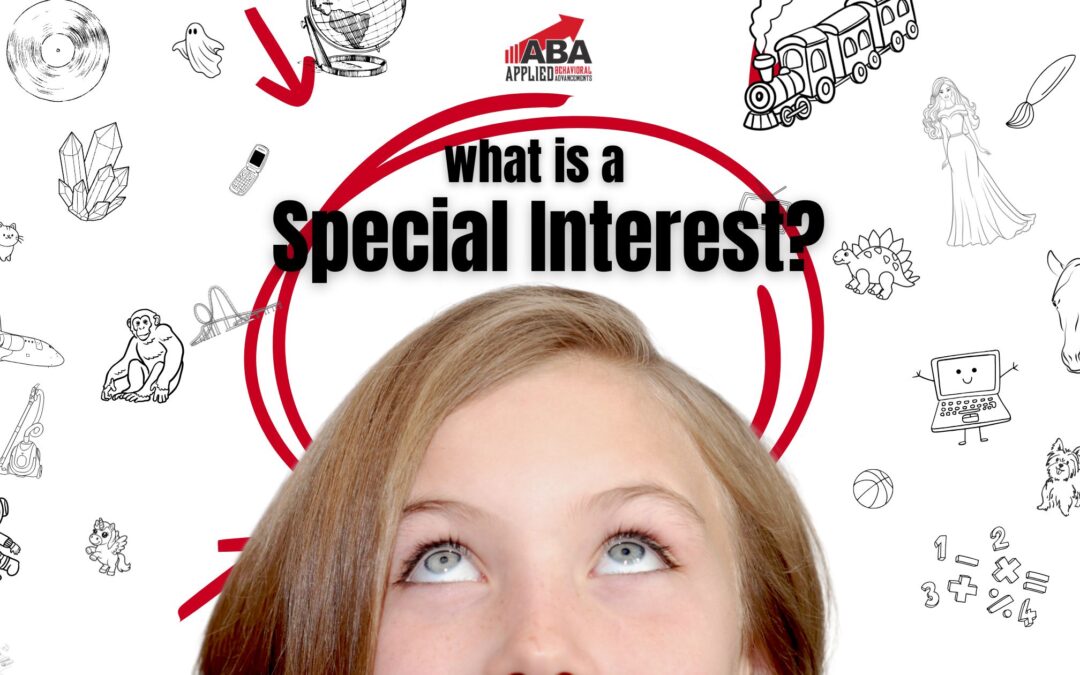What is a special interest?
A “special interest” is a focused, intense interest in a certain subject. Considered by the DSM-5 to be a diagnostic trait of autism. According to a 2014 scientific study, around 75-90% of autistic people develop a special interest. Special interests can last anywhere from a few months, to years, to a person’s entire life.
Anything can be a Special Interest; from certain sciences, eras of history, TV shows or characters, animals, sports, crafts, games, or even certain household objects. A person may have one special interest or cycle through a few different topics. Individuals spend countless hours researching the subject, collecting related items, and seeking to incorporate their special interest into daily activities.
Often, the term “special interest” is used to denote an interest that is outside the mainstream. From the outside looking in, this interest may seem strange. Perhaps it is considered inappropriate for a person’s age or gender. To a neurotypical person, a person’s special interest may appear obsessive or annoying. But for the individual with a special interest, these subjects can be a great source of comfort, stress-relief, and passion.
Special interests are related to repetitive behavior. This means that a person with a special interest may engage in behaviors like talking about their chosen subject nonstop or watching the same movies over and over. They are able to happily engage with the same subject over and over again without getting bored or desiring to move on. Their focus on this subject will be razor sharp. They may struggle to think or talk about anything outside the subject.
It’s important to note that as long as it isn’t hurting anybody, there’s no reason to dissuade a person from engaging with unconventional interests that add value and meaning to their life. However, special interests can become so intense that they interfere with a person’s ability to focus on other subjects, achieve goals at work, or even engage in social behaviors. For this reason, you should remember to be patient with your loved ones when they may seem stuck on a certain subject.
History of Special Interests
The idea of a “special interest” has been around since the autism diagnoses’ infancy. In 1827, Jean-Étienne Dominique Esquirol wrote about a condition he called “monomania” where individuals find themselves unusually preoccupied with a singular subject. In 1925, Grunya Sukhareva, a soviet psychiatrist often credited with being the first to pathologize autism, connected Eqsuirol’s writing with the autistic children she worked with. Important figures such as American psychiatrists Lauretta Bender and Paul Schilder and the Austrians Hans Aspberger and Leo Kanner also touched on the subject of fixation in their work.
In the past, terms like “circumscribed interests,” “obsessions” and “restricted interests” may have been used to describe highly focused interests of people on the spectrum. However, many autism rights advocates pushed back against these descriptions that they found to be unfairly pathologizing. After all, hobbies and interests are known to bring value and joy to the lives of a variety of individuals. For many autistic individuals, special interests can even fuel them into long-term academic and professional careers. The term “special interest” is preferred by autistic self-advocates because it embraces individuality and uniqueness.
Examples of Special Interests
Anything, literally anything, could be someone’s special interest. Trying to categorize all of the different special interests a person can have is a fools errand. They are unique and personal to each individual. But, it might be helpful to see some examples of how special interests manifest in peoples’ lives.
We have provided examples below from adults on the autism spectrum talking about their special interests.
Special Interests vs. Hobbies
Trying to describe the difference between a neurotypical person’s passions or hobbies and a person with autism’s special interest is a nuanced subject. Anyone who has either experienced a special interest themselves or have observed it in others can probably tell you that there are notable differences between the two. Both are valid ways of engaging with the world.
Special Interests are more intense than normal hobbies. A person can spend hours at a time fixated on their special interest, often ignoring cues to eat, drink, use the restroom, or care for personal hygiene in the process. It may interfere with work, school, or social interactions. For some individuals, not engaging with the interest causes extreme distress. For this reason, some autistic people have described their special interests as having the potential to be disabling and stressful.
The term “special interest” is used exclusively for people on the autism spectrum.
Supporting a Loved One’s Special Interest
If you have a loved one with Autism Spectrum Disorder (ASD), you may already be thinking about your loved one’s special interests. You may act supportively and buy your loved one books or objects related to their interest. Conversely, you may feel frustrated with your loved one’s inflexibility and insistence on focusing on this subject.
You should know that a person with ASD cannot choose their special interest. When you take the time to engage with your loved one’s special interest, by engaging with them in conversation, watching certain movies, or gifting them certain collectibles, you are showing the person you love that you care about them and their interests.
The Power of Special Interests
Many Autistic people take pride in their dedication and focus related to their special interests. For many, these interests can be the bridge to finding a place in the larger world. For example, Temple Grandin used her special interest in horses and electronics to fuel her career as a scientist. Consider how special interests can affect socialization. Someone who is quiet and shy in regular conversation may come out of their shell when their special interest comes up. We encourage people on the spectrum to embrace their special interest as a means to make friends, pursue your passions, and find joy.
About ABA-LLC
ABA-LLC is one of the largest suppliers of Behavior Support in the State of Kentucky. Since 2007, the agency has created innovative strategies to improve the lives of unique individuals. ABA-LLC works with around 190 contractors, each dedicated to building an inclusive culture that celebrates individuals of all abilities. No matter who you are, you can reach your goals at ABA-LLC.
ABA-LLC is set apart from its competitors by its uniquely person-centered approach. The agency strives to provide services from a place of deep love for the population they serve. Their work exemplifies the belief that every individual has a right to live a fulfilling and independent life integrated within their communities. There is no objective to change a person, but rather to give them the tools they need to succeed. B.F. Skinner summarizes this vision in his quote: “I’m not trying to change people. All I want is to change the world in which they live.” Learn more about us at https://aba-llc.com/

